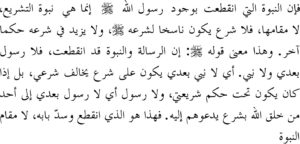The above passages are the explanation of Khatm-e-Nubuwwat that the Promised Messiah(as) has given. This is under attack. They claim it to be an established fact that all religious scholars of Islam have said that the Holy Prophet(sa) is the last Prophet both with reference to bringing a law and with reference to time. No Prophet of any kind can come after him. The opponents of Ahmadiyyat say that the Muslim ummah has not, does not, and will not tolerate any deviation from that interpretation. In their animosity, these opponents make such claims today. But let us see what some of the past Muslim scholars have to say on the subject. Renowned Sufi Hazrat Abu ‘Abdullah Muhammad bin ‘Ali Husain al-Hakim at-Tirmidhi (d. circa 255AH) writes:

Now listen to the translation carefully. He says:
As for the notion of those, deprived of goodness, that the term Khataman-Nabiyyin signifies that the Holy Prophet(sa) was the last Prophet to be commissioned, what glory and majesty is there in him being the last? And what wisdom underlies this interpretation? It is an interpretation put forth by the foolish and un-enlightened people. (Khatmul-Auliya’, p. 341)
This is the viewpoint that the Government of Pakistan wants to thrust upon Muslims all over the world. We say to them, if you say that all doors to prophethood are closed and no Prophet can come, then why are you waiting for Jesus Christ? Forget about him and relax. If no one is going to come, then all doors are closed. The opponents would say not at all, because the Holy Prophet(sa) is the last Prophet to be commissioned. Any Prophet who had been commissioned before the Holy Prophet(sa) could come again. They argue that all the past scholars believed the same thing, but that is a blatant lie. According to the above quotation, this is the interpretation of the foolish and un-enlightened. Moreover, there is no glory in it for the Holy Prophet(sa). In the same context, Hazrat Muhy-ud-Din Ibn-e-‘Arabi, the world renowned Muslim scholar and commentator (died 638 A.H.), writes:

Prophethood continues in the creation till the Day of Judgment, although law-bearing prophethood has ended. Bringing down a law is just a part of prophethood. (Al-Futuhatul-Makkiyyah, vol. 3, ch. 73, p. 159)
Would he be accused of being a disbeliever for the above words? Again, in the same book Hazrat Ibn-e-‘Arabi states:

The prophethood which came to an end with the advent of the Holy Prophet(sa) was law-bearing nubuwwat and not the status of prophethood. There is no room for prophethood which should abrogate the message of the Holy Prophet(sa) or should add anything to it. This is the correct meaning of the hadith which contains the Holy Prophet’s saying;

‘There is to be no Messenger or Prophet after me.’ The hadith only conveys that after the Holy Prophet(sa) such prophethood has come to an end and there can be no Prophet or Messenger after him, that is, who will replace his Shari‘ah with another one. (Ibid., p. 4)
Similarly, Sheikh Bali Afandi (died 960 A.H.) wrote:

Khatamur-Rusul is one after whom no Prophet with a new law can come. (Sharah Fusus-ul-Hikam, p. 56)
It is obvious that he is not denying the appearance of a Prophet, but rather he says that no Prophet can come with a new law.
Hazat Imam ‘Abdul-Wahhab Sha‘rani, a renowned Sufi, writes in his well known and authentic book Al-Yawa-qit wal-Jawahir, volume 2, page 35:

Bear in mind that prophethood per se has not ceased to exist. Only law-bearing prophethood has ended. (Al-Yawaqit wal-Jawahir, vol. 2, p. 35)
Hazrat Syed ‘Abdul-Karim Jilani writes:

With the advent of the Holy Prophet(sa), law-bearing prophethood came to an end. The Holy Prophet(sa) was declared Khatamun-Nabiyyin because he, and no other Prophet, brought the perfect law. (al-Insanul- Kamil, vol. 1, p. 115)
Hazrat Sheikh ‘Abdul-Qadir al-Kurdistani writes:

The title Khatamun-Nabiyyin conferred upon the Holy Prophet(sa) means that no other Prophet will be raised with a different law after him. (Taqribul-Maram fi Sharhe Tahdhibil-Kalam, vol. 2, p. 233)
The words ‘with a different law’ can have two meanings, one who follows a different law or one who brings a different law. With the former meaning, the return of Jesus Christ(as) after the Holy Prophet(sa) is impossible because, according to the Holy Qur’an, Jesus Christ was a Prophet for the Children of Israel, i.e., he followed the Mosaic law.